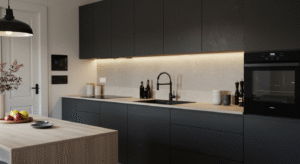If you’ve ever tossed and turned in bed wondering why you can’t fall asleep—even when you’re tired—light might be the culprit. From glowing alarm clocks to streetlights outside your window, artificial light surrounds us 24/7. That constant exposure messes with your internal sleep clock. But there’s a simple fix that doesn’t involve pills or pricey gadgets: sleep masks.
You might think sleep masks are just for long-haul flights or spa days, but more people are making them part of their everyday routine—and for good reason. Sleep masks are a proven, low-effort way to improve sleep quality, especially in a world that doesn’t shut off.
So, do they actually work? Let’s break it down.
What a Sleep Mask Does
At the most basic level, a sleep mask blocks out light. That may sound too simple to make a difference, but your body responds strongly to changes in light. Darkness triggers the release of melatonin, the hormone that tells your body it’s time to sleep. Light—especially blue light from screens—slows or stops that process.
Even with your eyes closed, your brain can detect ambient light in your room. That’s why a sleep mask that provides complete darkness helps signal to your body that it’s time to rest.
Why Sleep Masks Are Worth It
Still skeptical? Let’s get specific. Sleep masks can help:
-
You fall asleep faster. Darkness leads to faster melatonin release, which helps your brain wind down quicker.
-
You stay asleep longer. Fewer interruptions from light means fewer chances of waking up in the middle of the night.
-
You sleep better in unfamiliar places. Hotel rooms, planes, and guest beds usually come with light pollution. A sleep mask keeps your environment consistent.
-
You reduce dependence on sleep aids. If you rely on melatonin gummies or sleep meds, using a sleep mask might help you need them less.
Studies have even shown that people who use sleep masks report better sleep quality and improved alertness the next day.
Choosing the Right Sleep Mask
Not all sleep masks are built the same, and the wrong one can be more annoying than helpful. Here’s what to look for:
1. Total blackout: The number one job of a sleep mask is to block all light. A good one fits snugly around your nose and doesn’t let in light at the edges.
2. Comfort: You’re going to wear it for hours. Look for soft, breathable fabric and an adjustable strap. If it feels tight or itchy, it’ll just keep you up.
3. Eye space: If you don’t like fabric touching your eyelids, go for a contoured mask. These have molded shapes that leave space for your eyes while still blocking light.
4. Weight: Some people like light, barely-there masks. Others prefer slightly weighted ones for a calming effect. Try both and see what feels better.
5. Portability: A good sleep mask should be easy to fold, pack, and clean. Some come with carrying cases for travel.
A bad mask will make you ditch the idea in a night. A good one becomes something you don’t want to sleep without.
When to Use a Sleep Mask
Sleep masks aren’t just for overnight sleep. They’re great in other situations, too:
-
Napping: If you want to grab a quick nap during the day but can’t block out sunlight, a sleep mask makes that easier.
-
Traveling: Use it on flights, buses, or trains to rest when your schedule’s off.
-
Night shifts: If you sleep during daylight hours, you need darkness to help your body mimic a normal night.
-
Migraine relief: Many migraine sufferers are light-sensitive. A sleep mask can help reduce light exposure and provide some relief.
If you think your bedroom is already dark enough, test it out. Put on a sleep mask and see if the darkness feels deeper. It probably will—and your brain will notice.
Debunking the Myths
Myth 1: “I’ll feel silly wearing one.” Sure, it may take a night or two to adjust. But if you’re waking up more refreshed and sleeping deeper, you’ll stop caring about how you look and start caring about how you feel.
Myth 2: “I don’t need one—I already sleep fine.” Even if you think your sleep is good, a sleep mask can make it better. More REM sleep, fewer disruptions, and improved recovery all add up.
Myth 3: “They don’t work for everyone.” True—some people may not like the feel of a mask on their face. But that’s often a fit or fabric issue, not a fundamental flaw in the idea. There are dozens of designs out there. The right one makes all the difference.
Final Thoughts
If you’re serious about improving your sleep, don’t overlook the basics. While people chase sleep hacks, supplements, and smart tech, the humble sleep mask remains one of the simplest, most effective tools around.
It costs next to nothing, requires zero effort, and can go with you anywhere. And unlike a lot of things marketed to help you sleep, it actually does what it promises.
So yes, sleep masks really work—if you give them a real shot. Choose the right one, stick with it for a week, and see what changes. You might just wake up feeling better than you have in years.






